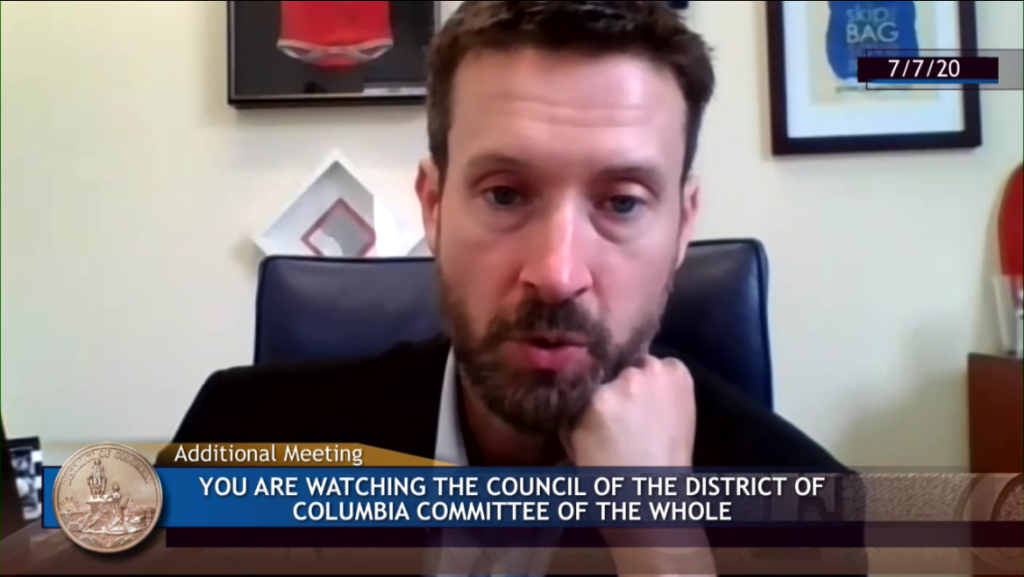By Grace Hu

remains a vast gulf between those with access to needed technology for
distance learning and those who do not; Courtesy of Connect D.C.
Despite over 45,000 D.C. households being left behind in critical services, education, and economic opportunities due to a lack of technology access, the Mayor and DC Council have made no commitment to close the digital divide in D.C.
The Mayor’s FY 2021 budget proposal, now being considered by the DC Council, includes no new initiatives to address the digital divide and provides minimal funding for current technology access initiatives. As of the writing of this article, the Council’s Committee of the Whole has held its first vote on the budget, in which it declined to provide additional funding to expand technology access. The Committee of the Whole will meet again on July 21 for a second vote before finalizing the budget later in the month.
Parents, including those at Amidon-Bowen Elementary, and the Washington Teachers’ Union have advocated for the Council to provide an additional $11 million to ensure all D.C. Public School students have computers for distance learning in the coming school year. The Mayor stated in mid July that DCPS would have sufficient devices “if 40% of students in grades K-12 need a device,” but it is unclear whether this would be enough to cover the need. Because family technology surveys conducted last school year were not standardized and, in some cases, parents were unreachable or not even asked, accurate school system-level data regarding the technology need of DCPS families does not exist. Surrounding school districts and some D.C. charter networks have already stated that they intend to reach a 1:1 student-device ratio for the next school year, guaranteeing technology access for all students.
Outside of the D.C. budget process, DCPS intends to use some federal funding from the CARES Act to purchase hotspots and data services to support Internet connectivity for students. Similar to the situation with devices, it is unclear whether these purchases will be sufficient to meet the needs across the school system.
Below is the status of FY 2021 D.C. budget funding related to the digital divide.
High-Speed Internet Access
Mayor’s Budget Proposal:
- No new funding for the Office of the Chief Technology Officer (OCTO) to expand Internet access for D.C. residents. Zero funding for FY 2021-FY 2026 in the Capital Improvements Plan for public WiFi expansion. OCTO is the lead technology agency for the D.C. government and would play a leading role in any government effort to close the digital divide.
Council Action:
- The D.C. Council’s draft budget bill (as of July 20) includes $1 million for a pilot to improve WiFi in public housing, led by OCTO in partnership with D.C. Housing Authority. This provision was included by the Committee on the Judiciary and Public Safety, chaired by Councilmember Charles Allen, and will enable the piloting of free WiFi at Potomac Gardens and Hopkins Apartments.
- No additional funding provided for other Internet access-related programs.
- Councilmember Allen proposed an amendment on July 7 (first budget vote by the Committee of the Whole) that would have provided $2 million to increase access to high-speed Internet for students doing distance learning. The provision was removed from the amendment due to objections from other councilmembers.

Whole hearing on July 7 – the only councilmember who has proposed
additional funding to address the digital divide during the DC Council’s
consideration of the FY 2021 budget; Courtesy of Author
Computers for D.C. Public Schools students
Mayor’s Budget Proposal:
- $6.9 million included in the DCPS budget to purchase 11,000 computers. The Mayor stated on July 16 that DCPS’s computer inventory, including new and older devices, would be sufficient “if 40% of students in grades K-12 need a device.” DCPS’s projected FY 2021 enrollment is approximately 53,000 students.
Council Action:
- No additional funding provided. (Parents who are part of the Digital Equity in D.C. Education Coalition and the Washington Teachers’ Union have asked the Council to find an additional $11 million to ensure that every student has a device for next school year.)
Technology training
Mayor’s budget proposal:
- Funding for OCTO’s Digital Inclusion Initiative, which funds efforts to help lower-income residents access technology through outreach and training, is reduced from $1.1 million to $387,000.
- DCPS’s base budget includes funding for teacher professional development, but the specific amount allocated for training related to technology and online learning is unclear.
Council Action:
- No additional funding provided.
For questions or comments related to this article, please email Digital Equity in DC Education at digitalequitydc@gmail.com.

